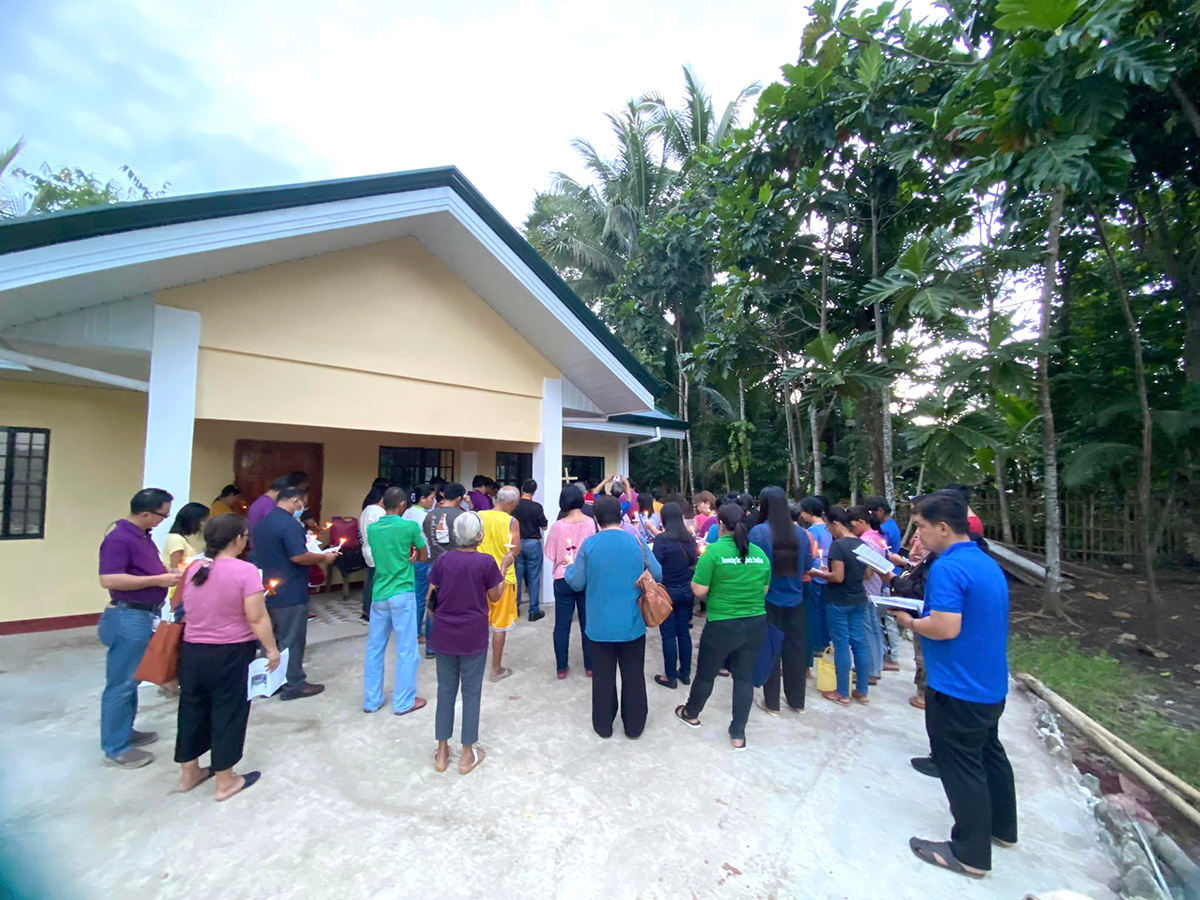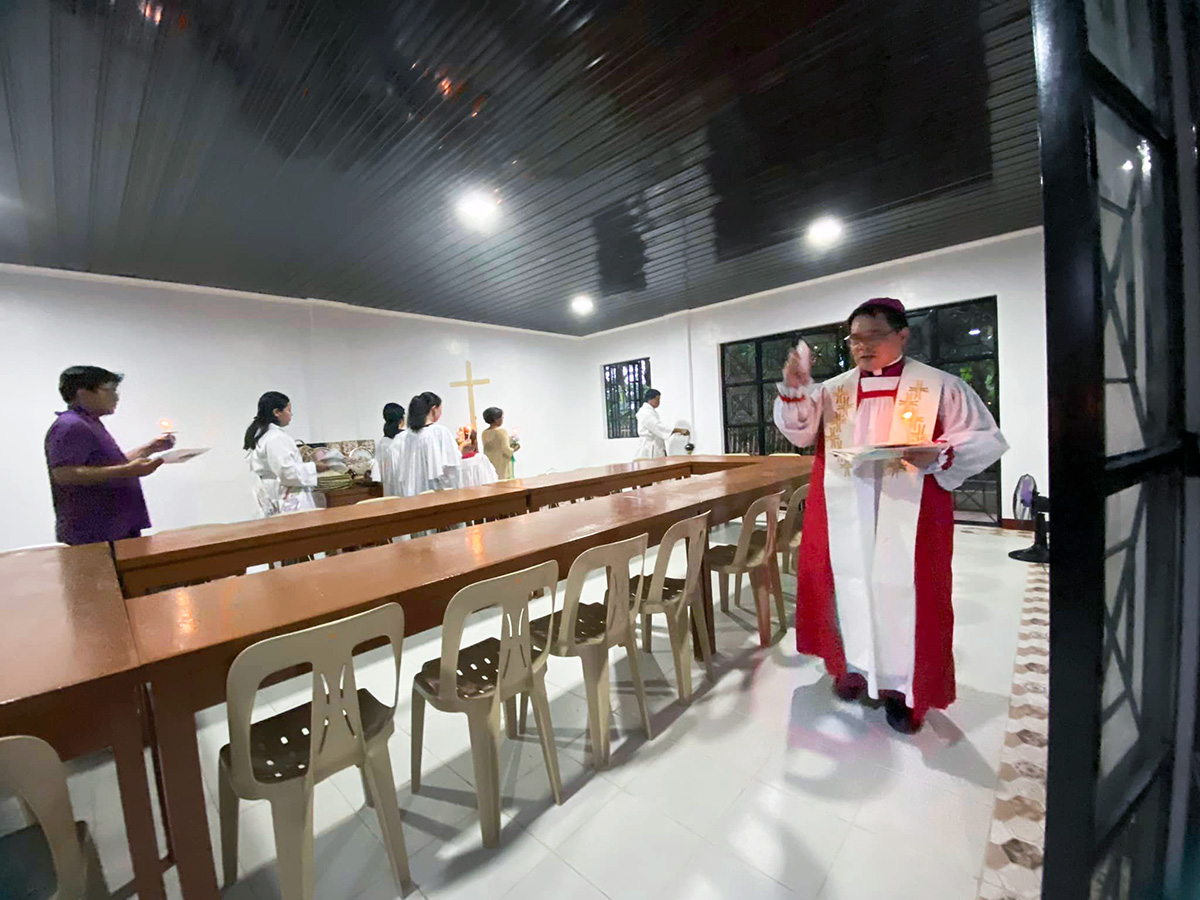New Community Centre Opens in the Philippines
Read the story of E-CARE and the Episcopal Church in the Philippines, and how their Asset-based Community Development approach, together with their Receivers to Givers practice (whereby those who receive then become givers to others), resulted in a new Community Centre in Aklan, one of the provinces in the Western Visayas region of the Philippines. It is a centre where local community members can come to receive training in skills that will help them improve their livelihoods. Funds from AID contributed to the cost of building the centre. We give thanks to our generous supporters.
In the Gospel lesson at the Feast of St. Nicholas, Jesus said. “Let the little children come to me, and do not hinder them, for the kingdom of God belongs to such as these. Truly I tell you, anyone who will not receive the kingdom of God like a little child will never enter it.” (Mark 10:14-15)
William Barclay asks “what is it about a child that Jesus liked and valued so much” which we need to have in order to receive the kingdom of God? He replies, “there is the child’s humility, trust, obedience, and a short memory that does not bear grudges or nourish bitterness.”
While deploring its horrible impact on lives and livelihoods, the pandemic was a re-set the button for humanity’s re-embrace of these qualities of a child. Among others, the pandemic compelled us to, like a child, look at the beauty of this world that we are recklessly damaging as well as the goodness of every person deserving of our love.
These were among the points of reflection at the service for the blessing of a community training centre at the Church of Good Shepherd in Batan, Aklan on 06 December 2022. Joining the local congregation at the service officiated by Episcopal Diocese of Central Philippines (EDCP) Bishop, The Rt. Rev. Rex B. Reyes, Jr., were members of the Episcopal Church in the Philippines (ECP) Executive Council which held this year’s last meeting the day before in nearby Boracay Island. It was an opportunity for the Council members to celebrate with partner communities the latter’s re-setting of the button which started pre-pandemic all the way back to 2013 when killer storm Yolanda turned their homes into an almost complete wasteland.
A few months before the killer storm, the Executive Council resolved to adopt the asset-based community and church development approach (ABCD) as well as the Receivers-to-Givers (R2G) practice as a way of life in the ECP. The aftermath of the killer storm then put this resolve to test. How can the ECP talk to people about relying on their own resources and assets and passing on gifts to others when they had heavily lost lives and livelihoods and had almost nothing?
Despite the seeming insensitivity of the question, the ECP leadership decided that it must bite the bullet as it can no longer go back to that time when developmental thrusts depended upon the grace of external partners. Explaining this resolve and expecting an understandable vehement rejection, it was a pleasant shock when these communities, who have never heard of the Episcopal Church in the past, not just accepted but actually fully embraced the ABCD approach and R2G practice. The rest is history.
Out of the ruins of Typhoon Yolanda at Sabang Bao in Ormoc City, a housing village was established – with both the cost of the land and part of the houses later granted back and passed on by the homeowners to others. (The bulk of the pass-on went to a number of communities, the latest of which were the earthquake victims of Makilala, North Cotabato who also established a similar housing village of their own.)
In the midst of this housing village rose Resurrection Episcopal Church, built entirely upon the contributions of partner communities in Leyte. From day one up to this time, the operational costs of the congregation, including the salaries and benefits of the priest in charge, were paid for by the same communities at no cost to the diocese or to the national Church.
This was exactly the same course adopted by partner communities in Aklan who similarly suffered massive devastation from Yolanda. Through ABCD and R2G, livelihood projects were done by several communities, now totalling 12, and out of these efforts to respond to human needs by a loving service, the Church of the Good Shepherd was born, with its beautiful chapel constructed out of the love and support of these communities. Similarly, congregational costs were fully assumed by the latter.
Fast-forward to 2020 when the COVID-19 pandemic turned the world upside down. Among the communities in Aklan, the re-setting of the button to what is truly important, intensified with communities surviving difficult times by looking at the beauty of creation and the goodness of humanity.
Farming communities who had rice gave some to fishing villages who had fish and vice-versa, with exchanges not based on commercial measures but purely on love and the desire to share with others. With lockdowns preventing people from doing their usual occupations, various crafts skills were shared so that more people can do buri bags-making, shell-crafts, vine plates and other home-based economic activities that brought food on their tables. Soon, the ECP’s Banquet Fund, augmented by support from Episcopal Relief and Development, Anglican Board of Mission in Australia, and Bread for the World, enabled 100 households (on top of the 12 partner communities) to start or re-establish livelihoods. All this was being done within the spiral of receiving, giving back and passing on.
It was these pandemic-coping efforts of the partner communities of Aklan which inspired the Anglican Communion Fund and the Anglican Board of Mission – Australia to also share what they can in order to be a part of the great story. Their contributions were augmented by the [ECP] National Church to put up the Aklan community training centre to provide a wider venue for livelihood skills training, that is one of the ECP’s best practices in disaster preparedness.
Continuous updating of their inventory of resources and sharing of skills and knowledge of crafts have resulted in prized assets and capacities in times of disaster when people are prevented from doing their usual occupations. The centre also provides the venue for fellowship, community building and spiritual nurture. It is now a monument to the peoples’ embrace of Christ’s teaching to receive the kingdom of God as a little child.
That preceding Sunday, the Prime Bishop, The Most Rev. Brent H.W. Alawas, and Episcopal Diocese of Southern Philippines (EDSP) Bishop, The Rt. Rev. Ernie M. Moral, received two and confirmed six at the Church of the Good Shepherd, and then received eight and confirmed 31 at Lonoy Preaching Station in neighbouring Capiz.
The blessing service and visit of Executive Council in Aklan were joyfully capped by the Church of the Good Shepherd’s expression of readiness to seek admission as a full fledge parish at the EDCP Convention in 2023.
Floyd P Lalwet
06 December 2022

The opening of the new Community Centre at Aklan © ECP. Used with permission.
